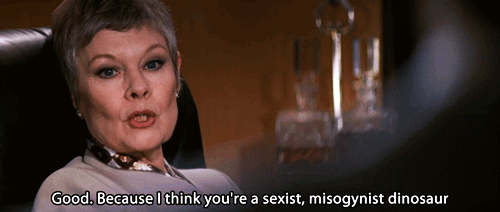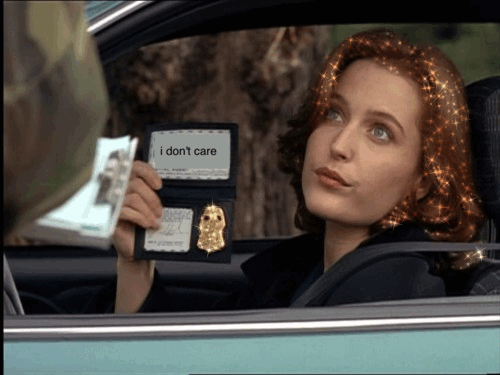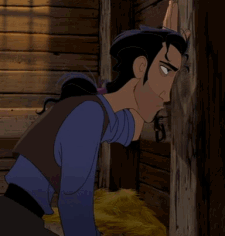I'm three chapters in and the question burns at the front of my mind: is Nerem in fact trying to destroy me?
The Dresden Files are urban fantasy very intentionally riffing off the style of Laurell K Hamilton's Anita Blake. They concern Harry Dresden, working-class wizard-for-hire of Chicago. I have never wanted to inflict violence on a protagonist so early in a story before. Ender Wiggin is an unfortunate abused child. Bean Delphiki even more so. Rand al'Thor is a naive farmboy with typical teenage self-obsession. These are people who can only bear so much responsibility for their faults.
I want to fight Harry Dresden. But rather than just ranting, let me take you on a journey into Storm Front, the first book of the Dresden Files, and soon you, too, can feel the bone-deep certainty that the world will be made a better place when this jackass meets you in the pit.
(Content: misogyny, gore. Fun content: I've been perusing my collection of reaction images to help me adequately respond to this tool.)
Storm Front: p. 1--?*
Chapter One: These Chapters Don't Actually Have Titles So I'm Probably Just Going To Make Some Up--This One Will Be Called "The Very Banality And Innocence" Because I Love A Good 'The King In Yellow' Reference
This book is written in first-person, which is a powerful and dangerous tool for any writer to wield--there's no more powerful way to express your protagonist's persona to the reader, but it also raises questions of reliability and relativity, and an irritating narrator is to reader interest what burning windmills are to mad scientists. If you want to know how badly a first-person narrator can skew your book's contents to readers, ask Vladimir Nabokov to stop spinning in his grave long enough to tell you how he feels about Lolita. In the first chapter, this won't be too pressing a matter, but in chapter two we're going to very quickly run into some serious questions about how to write flawed characters.
We meet Harry Blackstone Copperfield Dresden (forgivably over-the-top) in his office, where a new mail carrier is delivering a package and snickering at his door, which reads:
HARRY DRESDEN--Wizard. Lost Items Found. Paranormal Investigations. Consulting. Advice. Reasonable Rates. No Love Potions, Endless Purses, Parties, or Other Entertainment.In general, recognising that 'love potions' are fucked up is a good way to get me to like you, so I want to open by giving Dresden points for that. At least, I hope the reason he doesn't do love potions is because he understands they are mind-control drugs specifically optimised to override sexual consent.
The mail carrier is described as "a basketball with arms and legs and a sunburned, balding head", I y'all can bet I am going to be keeping a close gorram watch on how often Butcher makes characters fat when we're not supposed to like them. He is initially amused, then skeptical, and finally calls Dresden "a nut" before leaving.
Any urban fantasy kind of needs to open by defining its parameters--whether people in general know about magic, what kind of organisation it has in society, whether it's resulted in any major differences from our own Earth history, all that worldbuilding jazz. Dresden informs us that magic fell out of fashion and awareness in recent centuries because science was more exciting, but "images of exploding space shuttles, crack babies, and a generation of complacent Americans who had allowed the television to raise their children" has pushed people away from "science, the largest religion of the twentieth century" and people are starting to notice magic and psychics and vampires again.
Allow me to provide a visual representation of the way I feel when people call science a religion:
Pictured: a baby harpy eagle who would rather not, today.
Science, performed and organised correctly, is about observation and reproducibility. It is supposed to be about throwing out old ideas when new evidence contradicts them, about taking nothing for granted, and about always chasing new knowledge. I don't know the details of every religion in the world, obviously, but I have yet to see one that tries to draw statistical conclusions about the effectiveness and consistency of prayer or invocation. Religion is pretty big on dogma. Science isn't supposed to be. If you're going to call science a religion, I need you to define your terms. (If Dresden is trying to comment on the way the populace supposedly assumed that the invention of the airplane and the computer meant no one would ever have problems ever again, okay, that can be his opinion, but I have a lot more to say about the way good scientists would approach the discovery of magic as well, which I will spare you all for now only because I need to get to the part where you share my ire towards this jackwagon.)
Anyway. Dresden is behind on his bills and needs cash soon. I have some questions about what magic can or cannot do, and why a person with a rare command over supernatural powers works this and only this fetch-quest kind of job. Like, the absolute #1 question I have about magic in every single setting is 'can magic create food', because if it can, anyone with magical skills is a colossal upset to our normal economy--they don't need to worry about their own food supply and they literally always have access to a vital commodity they can trade to other people. JK Rowling just declared that magic couldn't conjure food from nothing, which answered that question pretty firmly, except then she footnoted that magic can multiply food, which, in the words of Hermes Conrad, just raises further questions. I'll allow Butcher more worldbuilding time before I start interrogating his hero's premise too harshly, though.
Dresden is quickly characterised for us as an honest worker; his only job in months was investigating a country singer's house in Missouri and quickly concluding that it was not haunted, unlike the fake psychic whom the singer hired a week later to perform a big fake exorcism. Dresden describes his own actions as "honest, righteous, and impractical", and I roll my eyes at our hero humblebragging about his heart of gold. The phone rings with a call from a nervous housewifey kind of person who wants Dresden to find her husband. Dresden quickly says people aren't his specialty and she should go to the police, which wins him many more points from me than he got by telling me about his honesty dealing with the singer. She tries to beg off by saying she can't go to anyone else, but Dresden cuts her off before she can hang up.
"I'm sorry, you didn't tell me your name." [....]
"Call me Monica."
People who know diddly about wizards don't like to give us their names. They're convinced that if they give a wizard their name from their own lip it could be used against them. To be fair, they're right.Dresden will keep doing this in the next couple of chapters: 'silly superstitious people who know nothing are afraid of X, but they absolutely should be afraid of it because it's terrifying and dangerous'. It takes a specific kind of arrogance to call someone ignorant for believing a true thing even though it sounds fake. Sigh.
Dresden convinces Monica to come to his office in an hour and explain her situation to him directly. The moment he sets down the phone, it rings again, and a few lines of dialogue later he declares that the appointment is in forty-five minutes, which would be clever foreshadowing in a book about time anomalies but here just vexes me. Harry Dresden would have seen nothing wrong with the many ages of Bonzo Madrid. The second call is from Director of Special Investigations Lieutenant Karrin Murphy of the Chicago police, and she wants Dresden (her preferred magic consultant) at the scene of a double homicide pronto. She's not worried about Dresden missing his appointment, because she is a gruff cop, and he snappishly agrees to go and be back in time anyway. Murphy recommends that he not eat lunch on the way.
"How bad are we talking here, Murph?"
Her voice softened, and that scared me more than any images of gore or violent death could have. Murphy was the original tough girl, and she prided herself on never showing weakness.I brim with apprehension whenever a female character is described like this, because it strikes me as a guarantee that their tough front will eventually be shattered and they will be left a broken wreck to show that the situation is serious. Has a male character ever been described like this? Someone get on that. (Also, calling an adult woman a 'tough girl' is a blaring orange flag that worse things are ahead.)
Dresden heads out, using the stairs instead of the elevator, half because electronics are unreliable in his presence and half because it's already occurred to him that if there's a murderous wizard on the streets, Dresden himself (the cops' only wizard-on-retainer) is probably a target as well. Not bad tension-raising for the end of the first chapter.
Chapter Two: This Is It; This Is What I Was Talking About; How Badly Do You Want To Fight Dresden Now
Jim Butcher elects to give us a physical description of his protagonist by explaining all the ways he doesn't look like Murphy, which I kind of like, if only because the duality of it raises Murphy's profile as a secondary protagonist. Dresden is an incredibly typical brooding gritty hero, tall and lean with dark hair and angular features, while Murphy is short, stocky, blonde and blue-eyed. Dresden also immediately informs us that Murphy never wears dresses, "though I suspected she'd have muscular, well-shaped legs, like a gymnast", which is obviously not a weird thing to think about your boss. He goes on with her description, adding her lack of earrings and her makeup-that's-so-good-it-looks-like-she's-not-wearing-makeup, which strikes me as oddly perceptive in a world so choked with men who apparently think women are born wearing a layer of foundation and Pomegranate Extremity lipstick.
Oh my god, Dresden even has a big black duster coat. I hope Butcher was trying really hard to write to formula here. Wikipedia seems to suggest that the cliches are intentional. Anyway. He also silently gives Murphy kudos for daring to meet his eyes for half a second:
It wasn't really dangerous unless you did it for several seconds, but I was used to anyone who knew I was a wizard making it a point not to glance at my face.There is only so far I am willing to follow you down the trail of 'I have weird mysterious powers that people are superstitious and intimidated about', Dresden. You're so powerful that it's dangerous to look into your eyes but you're also borderline unemployed and permanently broke? I'm going to start needing justifications soon.
They head for the door and Dresden races Murphy so he can open it for her, even though and indeed because he knows it irritates her. Ah, and here we are:
Maybe my values are outdated, but I come from an old school of thought. I think that men ought to treat women like something other than just shorter, weaker men with breasts. Try and convict me if I'm a bad person for thinking so.
Pictured: MI6 director M is entirely willing to take up Dresden's offer to go to court.
I enjoy treating a woman like a lady, opening doors for her, paying for shared meals, giving flowers--all that sort of thing.
Pictured: Special Agent Dana Scully will tell Dresden when she wants his opinion on women again, which will be never.
I don't even know what to do with this. "Men ought to treat women like something other than just shorter, weaker men with breasts." Well, yes, that's true. That's true for a lot of reasons, starting with women not being shorter, weaker men with breasts. Faith and fucking begorrah. I guess we'll start with the purely scientific objection, which is that men being stronger than women on average tells you basically nothing about whether any given man will be stronger than any given woman, because the variations within a gender are vastly greater than the difference in averages. (Actual studies on this are not the easiest thing to find, especially if you want studies that aren't saturated with biases, bad methods, bad data presentation, and the occasional dash of MRA meninist whining. Suffice perhaps to compare for yourselves the current world records in that manliest activity, lifting heavy objects: yes, the men's olympic lifting records are higher than the women's, but when comparing similar weight categories, the differences are fairly small and everyone is lifting multiple times their own body weight. Dresden, bro, do you even lift?)
Next, Dresden, have you considered that maybe the correct way to treat women is LIKE PEOPLE? Chivalry isn't dead--it's a fricking zombie that refuses to die no matter how many times we bury it because it feeds on the keening wails of men who don't understand why opening doors for women just won't translate into getting laid. I sometimes open doors for women, I sometimes pay for meals for women, yes, and they do the same for me, and likewise with my friends who are men. I do these things because they are nice things to do for people I like, not because I'm trying to provide women with the support they need to get over their fundamental deficiencies of ladyness. So the real question here, Dresden, is why you're only doing nice things for women and not men. WHY ARE YOU SUCH A MISANDRIST, DRESDEN?
Pictured: Tulio attempts to forget the conversation he just had with a brooding antihero with a heart of chauvinist gold. Y'all don't even know the kinds of stupid, misogynist screeds I read with my own two eyes in my quest for good data.
In short, locking women into the kitchen to be barefoot and pregnant is unquestionably terrible, but that doesn't mean that putting them on a pedestal to be delicately cared for and pruned or whatever is somehow good. And I might not be able to convict you for being a sexist creep, Dresden, but I can definitely judge you harshly.
Where were we? Oh, yeah, double homicide.
Dresden follows Murphy up to the seventh floor to a plush romantic suite that smells of blood. (The elevator scene is brief, silent, and actually kind of good: "I licked my lips and looked around the interior of the car. My shadow and Murphy's fell on the floor, and almost looked as though they were sprawled there. There was something about it that bothered me, a nagging little instinct that I blew off as a case of nerves. Steady, Harry.") Murphy leaves him in the first room for a minute, where he examines his surroundings in a vaguely ESP kind of way, making visual observations with his eyes nearly shut, noting champagne, a stray rose petal, and a half-torn black thong under a chair, which Dresden summarises as "Kinky". Dresden has not read Fifty Shades or he'd save that for the eggbeaters.
We are then introduced to Murphy's skeptical partner, Carmichael. Dresden rattles off a laundry list of things that are meant to make Carmichael's unattractiveness clear, starting with being fat and bald, and then goes for a swerve with "razor intellect [....] absolutely ruthless at tracking down killers". I tentatively mark this as the second fat character we've met and the second we're not supposed to like, regardless of the 'razor intellect' remark supposedly showing that Dresden respects him. They snipe at each other a bit before Dresden comes in to see the bodies.
Now, I realise magic is at play here, but I think it's fair to question how and why it is that these people (who died in the middle of sex) managed to remain frozen in the exact pose they had when an evil wizard literally made their hearts explode like fragmentation piñatas. The description "she was astride him, body leaned back, back bowed like a dancer's" sounds to me like she's still more or less sitting upright, no? Either way, now we're apparently seated in the 'erotic violence' section of the train and I'm prepared to tuck and roll.
Clues, blood, gross stuff, clues, and then Dresden finally runs out of the room to throw up--Carmichael wasn't joking when he said he'd bring a bucket.
Dresden's frantic disgusted thoughts weave in some worldbuilding:
...someone had used magic to do it. They had used magic to wreak harm on another, violating the First Law. The White Council was going to go into collective apoplexy. This hadn't been the act of a malign spirit or a malicious entity, or the attack of one of the many creatures of the Nevernever, like vampires or trolls. This had been the premeditated, deliberate act of a sorcerer, a wizard, a human being able to tap into the fundamental energies of creation and life itself.So now we know magic does have some kind of organisation ('White Council' isn't the name I would choose, but... okay...) and laws, and we have a sort of charmingly juvenile name, 'Nevernever', for the realm of monsters. And we're only in the second chapter! Can you imagine how many posts into a WOT book I'd have to get before we heard about 'the Nevernever, what some call Monsterpalooza, where dwells the Scarytown Crew that you know as the Naz'gool'.
Dresden does tend a little bit that way when he starts talking magic:
"Evocation is the most direct, spectacular, and noisy form of expressed magic, or sorcery. [....]
"What's the other option?" Murphy asked.
"Thaumaturgy," I said. "As above, so below. Make something happen on a small scale,and give it the energy to happen on a large scale."Which isn't bad terminology, really. 'Evocation' literally means 'calling something forth', while 'thaumaturgy' means 'magic-shaping', following the same pattern as 'metallurgy'. I feel some small spark of hope that this will be the first fantasy series I've seen to correctly use '-mancy' suffixes only to refer to divination magic.
There's more magic worldbuilding as Dresden explains the intimacy of spellcasting and concludes that the killer had to know the victims in order to use this particular magical approach, by having intense personal reasons to want them dead. Oh, great, before this chapter can end on a strong note we have to endure another one of Dresden's pontifications on gender:
Murphy glared at me. "You keep saying 'she,' " she challenged me. "Why the hell do you think that?"
I gestured toward the room. "Because you can't do something that bad without a whole lot of hate," I said. "Women are better at hating than men. They can focus it better, let it go better. Hell, witches** are just plain meaner than wizards. This feels like feminine vengeance of some kind to me."
Pictured: WHATNAPPLE RETURNS TO AID ME
Are you fucking kidding me, Dresden? Jim Butcher, what the fuck? Please tell me you're going for an unreliable narrator here. Please don't be actually this stupid. Please let the killer also be a man just to highlight how wrong Dresden is.
"Christ, you are a chauvinist pig, Dresden."Lieutenant Murphy, you have my sword.
Dresden sort of agrees to try to reverse-engineer the magic, and Murphy banishes Carmichael to fetch her coffee before explaining who the victims are: the woman is a sex worker for a well-regarded company run by a vampire ("vampiress" oh my god shut up Dresden) named Bianca, and the man is the personal bodyguard to Chicago's new king of the mob, Johnny Marcone, a relatively civilised crimelord who's put an end to past bloody clashes with the police and gone all Ankh-Morpork Guild of Thieves on excessive elements in the city, doing a better job of stamping out some violent criminals than the police do.
I had honestly forgotten what it was like to have antagonists with immediate presence who are relevant to their environment and not just, like, abstract concepts and generic monsters. I bet I'd be enjoying this book less if I hadn't just endured so much WOT.
Dresden has tried to put a disclaimer on his ability to work out how the murder spell worked, but Murphy doesn't buy it. Dresden weasels out of explaining himself, but notes in the narration that he's got some kind of checkered past with the White Council and he's on double secret wizard probation, bearing something called the Doom of Damocles. I like the name because it's self-explanatory (danger hanging over his head) without sacrificing some mythic flavour. Anyway, Dresden's pretty sure he'll get a Doom to the head if word gets out that he's trying to build a murder spell, and apparently sending advance notice ("Hey, I'm tracking a murderer who broke our First Law, please don't kill me") is not an option? He instead concludes that he'll just need to keep it quiet. Brilliant. If this incident is so bad, shouldn't the Council have their own investigators on the case? Shouldn't they at least be able to spare someone to keep an eye on Dresden while he helps the police? What are the jurisdictional rules for something like this?
They leave, Dresden's got five minutes to make the fifteen-minute trek back to his office for his appointment with Monica the mystery client, and he's halfway there when he gets surrounded by beefy goons who forcibly invite him to get into a car with Johnny Marcone, and that is where the chapter ends.
Initial impressions: Harry Dresden is a gigantic tool made of smaller tools in a sort of fractal jackwagonry array, but Murphy is a good character, I'm interested in the setting, and within a mere two chapters we've got a web of plot threads that connect us to a mysterious disappearance, a vengeful sorcerer, a vampire madam, organised crime, and the secret council that runs all magic. Rand al'Thor needs more pagetime than that to eat lunch and stare longingly at the hot girl he imagines he's in love with. I may brim with rage throughout this book, but at least it won't linger.
---
*Thanks to ebook formatting, the pagecount varies wildly depending on how I size my reader screen, so I have little hope of keeping a consistent tally of pages as we proceed. I'm tempted to use abstract concepts (Storm Front: p. Mangrove to Banyan) but combining that with my suggested chapter titles is just going overboard.
**ALSO I HAVE STRONG OPINIONS ON THE GENDERING OF WITCH AND WIZARD. That's not how it works. 'Wizard' is just 'intensely wise', following the pattern of 'drunkard' and 'coward'. 'Witch' derives from 'wicce', which has a contested etymology to say the least, but originally 'wicca' was male and 'wicce' was female, and we melded both words when we took them for English. Female wizards and male witches are 100% legit, not a weird special case, and definitely not gendered terms for identical roles. (I'll stop here instead of further ranting on the notion that 'warlock' is the male equivalent of witch.)





No comments:
Post a Comment